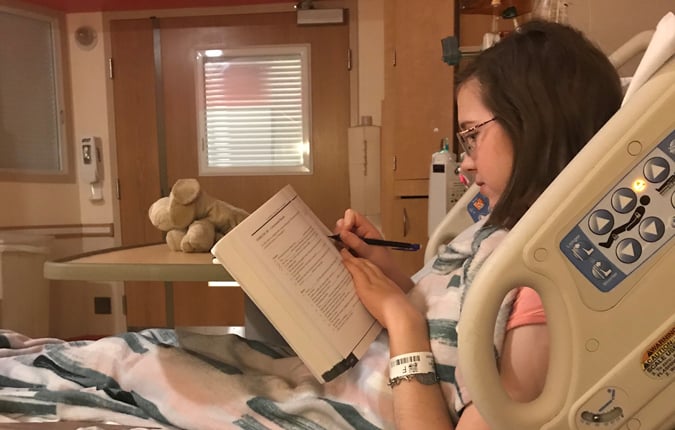
Helping Maddie to Live Life to the Fullest

Maddie, a high school student, says she’s an extrovert. “First of all, I love theater,” she says. “I love developing characters and experiencing things unlike real life ― like playing a villain or casting magic spells.” She says it can be stressful to be onstage. But when the audience and other cast members respond, she feels a sense of purpose, security and togetherness.
Care providers at the Rare Disease Institute at Children’s National Hospital gave Maddie a similar feeling. She’s been in and out of the hospital her whole life, with conditions from severe reflux to fructose intolerance to sleep apnea. As a younger child she experienced balance issues and difficulty regulating her temperature, swallowing and chewing.
“My family moved to the Washington D.C. area when I was 5,” Maddie says. “Going to the hospital used to scare me, but not after starting at Children’s National. The doctors talked directly to me. They wanted to know about me and what I wanted to do in life, not just about what was wrong with me.”
Doctors explained what they knew and what they didn’t. The details of her disease often were confusing and frightening. She could express her worries. “That gave me a kind of normalcy, which helped me stay calm,” she says. “Also, I knew my team would always try to help.”
Maddie saw a wide variety of pediatric specialists. Over the years, she weakened and relied heavily on medical supports, such as a wheelchair and an IV pump for fluids and nutrition. Doctors diagnosed her with an undefined mitochondrial disorder. Then, she began seeing Kim Chapman, MD, PhD, a former medical geneticist at Children’s National Rare Disease Institute. Maddie and other members of her family also participated in a research study that would help physician scientists uncover clues through their DNA. Doctors customized Maddie’s treatment and in high school, this led to big improvements. She has more energy and no longer needs her wheelchair.
The young actress soon had three major roles in a high-energy school play. “It was insanely fun,” she says. “People at Children’s National, from the lady at registration to Dr. Chapman and everyone in between have always inspired me to live the best life I can. I hope I have a long life. Children’s National gives me hope that I might.”
Care providers at the Rare Disease Institute at Children’s National Hospital gave Maddie a similar feeling. She’s been in and out of the hospital her whole life, with conditions from severe reflux to fructose intolerance to sleep apnea. As a younger child she experienced balance issues and difficulty regulating her temperature, swallowing and chewing.
“My family moved to the Washington D.C. area when I was 5,” Maddie says. “Going to the hospital used to scare me, but not after starting at Children’s National. The doctors talked directly to me. They wanted to know about me and what I wanted to do in life, not just about what was wrong with me.”
Doctors explained what they knew and what they didn’t. The details of her disease often were confusing and frightening. She could express her worries. “That gave me a kind of normalcy, which helped me stay calm,” she says. “Also, I knew my team would always try to help.”
Maddie saw a wide variety of pediatric specialists. Over the years, she weakened and relied heavily on medical supports, such as a wheelchair and an IV pump for fluids and nutrition. Doctors diagnosed her with an undefined mitochondrial disorder. Then, she began seeing Kim Chapman, MD, PhD, a former medical geneticist at Children’s National Rare Disease Institute. Maddie and other members of her family also participated in a research study that would help physician scientists uncover clues through their DNA. Doctors customized Maddie’s treatment and in high school, this led to big improvements. She has more energy and no longer needs her wheelchair.
The young actress soon had three major roles in a high-energy school play. “It was insanely fun,” she says. “People at Children’s National, from the lady at registration to Dr. Chapman and everyone in between have always inspired me to live the best life I can. I hope I have a long life. Children’s National gives me hope that I might.”
Maddie's Care Team Departments


Be the Reason a Child Smiles
Every day at Children’s National Hospital, lives are changed through compassionate care and groundbreaking discoveries. Your charitable donation helps us deliver expert treatment and hope to thousands of children and families.
Meet the patients whose stories inspire us—and see the difference your support makes.



